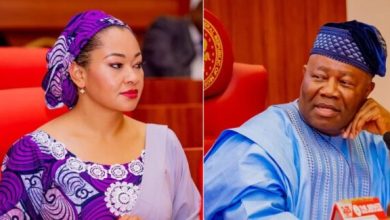In a strongly worded statement, the South East Accountability and Transparency Initiative (SEARAP) has issued a stern warning to Senate President Godswill Akpabio, condemning what it describes as an abuse of power in the alleged blocking of Senator Natasha Akpoti-Uduaghan’s resumption of her senatorial duties. The group’s statement, released on September 8, 2025, has sparked widespread discussion, raising critical questions about democratic principles, the rule of law, and the integrity of Nigeria’s legislative processes. The controversy surrounding Senator Akpoti-Uduaghan’s situation underscores deeper systemic issues within the Nigerian Senate, including allegations of political vendettas, gender discrimination, and the misuse of institutional authority.
Background of the Controversy
Senator Natasha Akpoti-Uduaghan, representing Kogi Central Senatorial District, has been at the center of a contentious political saga following her victory in the 2023 general elections. A member of the People’s Democratic Party (PDP), Akpoti-Uduaghan’s election was initially challenged, leading to a prolonged legal battle that culminated in her being declared the rightful winner by the courts. Her eventual swearing-in as a senator was a significant milestone, not only for her but also for the people of Kogi Central, who saw her as a beacon of hope for progressive representation.
However, reports have surfaced that Senator Akpoti-Uduaghan has been prevented from fully resuming her legislative duties. According to SEARAP, this obstruction is allegedly orchestrated by Senate President Godswill Akpabio, who is accused of leveraging his position to sideline the senator for reasons that remain speculative but are widely believed to be politically motivated. The group’s statement explicitly calls out Akpabio, accusing him of undermining democratic norms and abusing his authority as the leader of the Nigerian Senate.
SEARAP’s Position and Allegations
SEARAP, a prominent civil society organization focused on promoting accountability and transparency in governance, has taken a firm stand against what it perceives as an affront to Nigeria’s democratic values. In its statement, the group argued that preventing a duly elected senator from performing her constitutional duties is not only a violation of her rights but also an attack on the democratic will of the people of Kogi Central. The organization emphasized that Senator Akpoti-Uduaghan’s mandate was affirmed by the judiciary, making any attempt to obstruct her participation in the Senate a direct challenge to the rule of law.
The group further accused Akpabio of engaging in actions that erode public trust in the Senate as an institution. According to SEARAP, the Senate President’s alleged actions are indicative of a broader pattern of power misuse, where personal or political interests take precedence over the collective good. The statement highlighted the need for transparency and fairness in the Senate, urging Akpabio to reconsider his approach and allow Senator Akpoti-Uduaghan to carry out her duties without hindrance.
SEARAP’s warning also carried a broader message about the state of democracy in Nigeria. The organization called on stakeholders, including other lawmakers, civil society groups, and the general public, to resist any attempts to undermine elected officials through undemocratic means. The group stressed that the Nigerian Senate, as a critical arm of government, must uphold the principles of fairness, equality, and accountability to maintain its legitimacy in the eyes of the public.
Senator Natasha Akpoti-Uduaghan: A Profile in Resilience
To fully understand the significance of this controversy, it is essential to examine the background of Senator Natasha Akpoti-Uduaghan. A lawyer, activist, and entrepreneur, Akpoti-Uduaghan has built a reputation as a formidable advocate for social justice and economic empowerment. Born in Kogi State, she has consistently championed the rights of marginalized communities, particularly in Nigeria’s North Central region. Her political journey has been marked by resilience, as she faced significant opposition during her campaign for the Senate.
Akpoti-Uduaghan’s victory in the 2023 elections was a testament to her popularity and the trust placed in her by the people of Kogi Central. Her campaign focused on critical issues such as infrastructure development, youth empowerment, and gender equality, resonating with a broad cross-section of voters. However, her path to the Senate was fraught with challenges, including allegations of electoral malpractices and attempts to discredit her candidacy. The judiciary’s eventual ruling in her favor was seen as a triumph of justice over entrenched political interests.
As a senator, Akpoti-Uduaghan has sought to bring her activist spirit to the legislative arena, advocating for policies that address systemic inequalities and promote sustainable development. Her vocal stance on issues such as gender-based violence, education, and economic inclusion has earned her both admiration and criticism. Some analysts suggest that her progressive agenda and willingness to challenge the status quo may have made her a target for political adversaries within the Senate.
The Role of the Senate President
The Senate President is one of the most powerful positions in Nigeria’s political hierarchy, wielding significant influence over the legislative process. As the presiding officer of the Senate, the Senate President is responsible for maintaining order, facilitating debates, and ensuring that the Senate operates in accordance with its rules and the Nigerian Constitution. However, the position also comes with immense responsibility to act impartially and uphold democratic principles.
Godswill Akpabio, a former governor of Akwa Ibom State and a prominent figure in the All Progressives Congress (APC), assumed the role of Senate President in 2023. His tenure has been marked by both achievements and controversies, with critics accusing him of prioritizing party loyalty over institutional integrity. The allegations leveled by SEARAP add to a growing list of concerns about Akpabio’s leadership style, with some observers questioning whether his actions align with the principles of fairness and inclusivity.
In the case of Senator Akpoti-Uduaghan, the precise nature of the alleged obstruction remains unclear. However, SEARAP’s statement suggests that Akpabio may be using his authority to limit her participation in Senate activities, potentially through procedural maneuvers or administrative decisions. Such actions, if true, would represent a significant departure from the norms of legislative governance and could set a dangerous precedent for the treatment of elected officials.
Broader Implications for Nigerian Democracy
The controversy surrounding Senator Akpoti-Uduaghan’s resumption raises critical questions about the state of democracy in Nigeria. At its core, the issue touches on the principles of representation, accountability, and the separation of powers. By allegedly obstructing a senator’s ability to perform her duties, the Senate President risks undermining the democratic process and eroding public confidence in the legislature.
Nigeria’s democracy, though relatively young, has made significant strides since the return to civilian rule in 1999. However, it continues to grapple with challenges such as electoral irregularities, political violence, and the concentration of power in the hands of a few. The Senate, as a key pillar of the democratic system, plays a crucial role in checking the excesses of the executive and ensuring that the voices of all Nigerians are heard. Any attempt to silence or marginalize a duly elected representative threatens to weaken this delicate balance.
Moreover, the situation highlights the issue of gender dynamics in Nigerian politics. Women remain significantly underrepresented in Nigeria’s political sphere, with only a handful of female senators and representatives in the National Assembly. Senator Akpoti-Uduaghan’s experience as a female legislator facing alleged obstruction raises concerns about systemic gender bias within the political establishment. SEARAP’s statement alluded to this issue, noting that the senator’s treatment could discourage other women from pursuing political office.
The Legal and Constitutional Perspective
From a legal standpoint, the obstruction of a senator’s duties raises serious constitutional questions. The 1999 Constitution of Nigeria (as amended) guarantees the rights of elected officials to carry out their mandates without undue interference. Section 68 of the Constitution outlines the circumstances under which a senator’s seat may be declared vacant, none of which appear to apply in this case. Senator Akpoti-Uduaghan’s election was upheld by the courts, and there is no evidence to suggest that she has violated any constitutional provisions that would justify her exclusion from Senate activities.
Furthermore, the Senate’s own rules emphasize the importance of equal treatment for all members. The Senate President, while vested with significant authority, is expected to act in a manner that promotes fairness and inclusivity. Any attempt to prevent a senator from participating in plenary sessions, committees, or other legislative functions could be seen as a violation of these principles and potentially subject to legal challenge.
SEARAP’s statement called for immediate action to address the situation, urging the Senate leadership to respect the rule of law and ensure that Senator Akpoti-Uduaghan is allowed to fulfill her mandate. The group also hinted at the possibility of legal action if the issue is not resolved, signaling that the controversy could escalate further in the coming weeks.
Public and Political Reactions
The allegations against Akpabio have elicited a range of reactions from political stakeholders and the general public. Supporters of Senator Akpoti-Uduaghan have taken to social media platforms, including X, to express their outrage and demand accountability. Hashtags such as #JusticeForNatasha and #LetNatashaWork have gained traction, reflecting widespread public support for the senator and growing frustration with perceived abuses of power in the Senate.
Opposition parties, particularly the PDP, have seized on the issue to criticize the APC-led Senate leadership. PDP spokespersons have described the situation as a “blatant assault on democracy” and called for an investigation into Akpabio’s actions. Some APC members, however, have dismissed the allegations as politically motivated, arguing that SEARAP’s statement lacks evidence and is part of a broader campaign to discredit the Senate President.
Civil society organizations have also weighed in, with many echoing SEARAP’s call for transparency and accountability. Groups such as the Nigerian Bar Association and the Civil Liberties Organisation have urged the Senate to address the issue promptly to prevent further damage to its reputation. Analysts suggest that the controversy could have far-reaching implications for Akpabio’s leadership and the APC’s image ahead of future elections.
The Path Forward
As the controversy unfolds, all eyes will be on the Senate and its leadership to see how they respond to SEARAP’s allegations. For Senator Akpoti-Uduaghan, the situation represents yet another hurdle in her quest to serve her constituents effectively. Her resilience in the face of adversity has already earned her widespread admiration, and many believe she will continue to fight for her rights and those of the people she represents.
For Senate President Akpabio, the allegations present a significant challenge to his leadership. How he navigates this situation will likely shape public perceptions of his tenure and influence the Senate’s credibility as an institution. A transparent and fair resolution to the issue could help restore trust, while any further escalation could deepen divisions within the Senate and beyond.
SEARAP, for its part, has vowed to continue monitoring the situation and advocating for accountability. The group’s statement concluded with a call to action for all Nigerians to stand up for democracy and resist any attempts to undermine elected representatives. “The Senate belongs to the people, not to any individual or group,” the statement read. “We will not stand idly by while the will of the people is subverted.”
Conclusion
The controversy surrounding Senator Natasha Akpoti-Uduaghan’s alleged obstruction in the Nigerian Senate is a stark reminder of the fragility of democratic institutions in Nigeria. SEARAP’s warning to Senate President Godswill Akpabio underscores the need for transparency, accountability, and respect for the rule of law in the legislative process. As the situation develops, it will serve as a litmus test for Nigeria’s commitment to democratic principles and the equitable treatment of all elected officials.
For Senator Akpoti-Uduaghan, the fight is not just about her right to serve but also about the broader struggle for a more inclusive and just political system. Her story resonates with millions of Nigerians who yearn for a democracy that truly reflects their aspirations. As the nation watches, the resolution of this controversy will have significant implications for the future of governance in Nigeria, shaping the narrative around power, representation, and accountability in the years to come.







